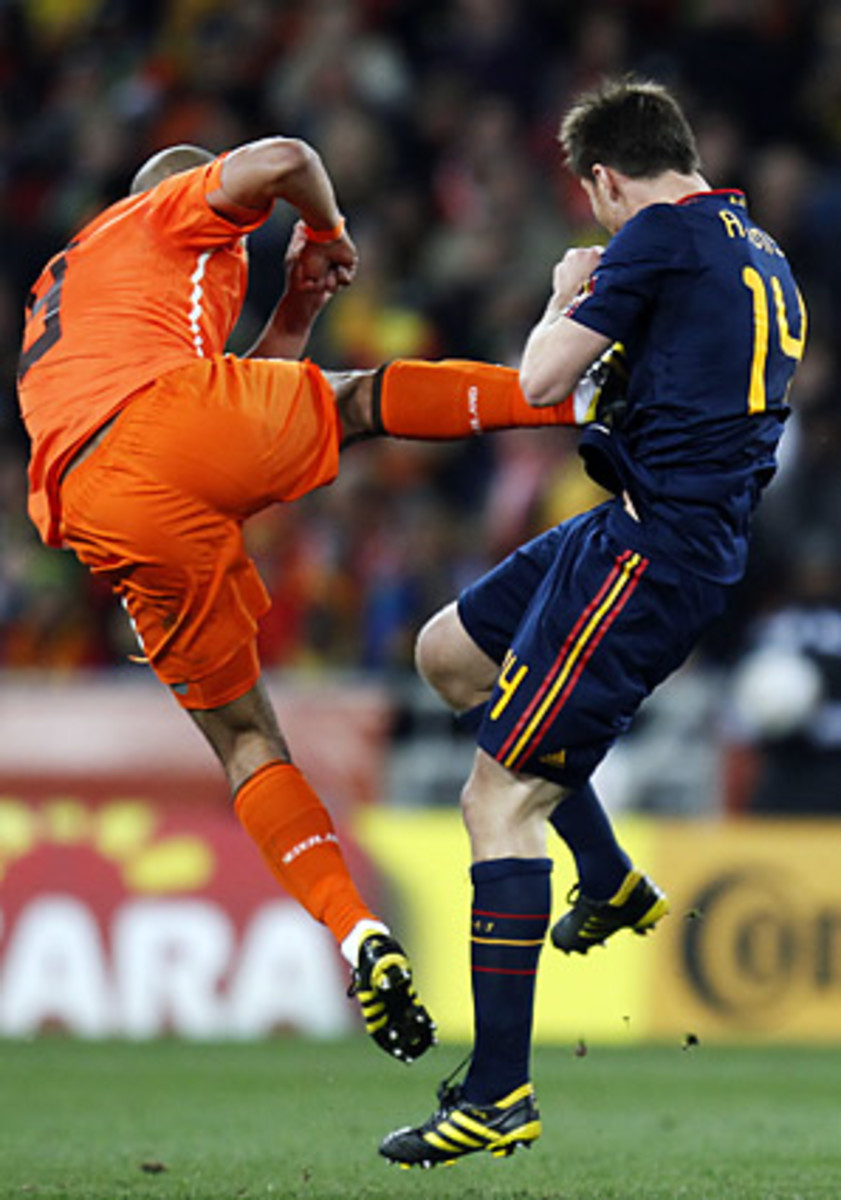
Spain overcomes Dutch brutality
A fourth 1-0 win in a row doesn't tell the full story; Spain had none of the control it had possessed in the previous three rounds, as the Netherlands effectively kicked it out of its rhythm. An open extra time gave the game some credit, but this was a match ruined by Dutch brutality. Referee Howard Webb was booed by the crowd and will no doubt be harangued by pundits, but the greatest share of the blame belongs to the Netherlands and its negativity. The goodwill built up by years of attractive football was severely depleted by 120 sorry minutes. A more defensive approach is one thing; borderline anti-football is something else.
Although the game quickly degenerated, Spain actually began with the same fluency it had shown against Germany in the semifinal, with Sergio Ramos hurtling forward from fullback into a channel created for him by Pedro drifting in off the right flank, drawing Dutch fullback Gio van Bronckhorst with him. It was that right side that yielded two chances in the first quarter-hour -- Ramos first being denied by a fine save from Maarten Stekelenburg, and then skipping by Dirk Kuyt and drilling in a cross that Johnny Heitinga deflected over.
The corollary of Spain's control of possession is the pressure it puts on opponents, something that is not down just to its pressing but the psychological impact of knowing that if you squander possession, you may not see it again for two to three minutes. When Manchester United lost to Barcelona in the 2008 Champions League final, it was notable that certain players grew so tentative that even the simplest 10-yard pass became a trauma. The Dutch, unusually anxious with the ball, seemed to be heading that way, and then suddenly their approach changed, and they became physical to the point of thuggishness.
Mark van Bommel could easily have been sent off for a lunge on Andres Iniesta (the Dutch midfielder player received only a yellow), and he should have had a second yellow for a foul on Xavi. Van Bommel then got away with what appeared to be a stamp on Iniesta after halftime. Nigel de Jong probably should have been sent off for a horrible chest high kick on Xabi Alonso. Wesley Sneijder was fortunate to get away with a late challenge on Sergio Busquets. It wasn't pretty, and was frankly reprehensible, but it did knock Spain out of its rhythm.
Spain was clearly sinned against, but there was also a sense that its players didn't help themselves. The Spanish press severely criticized Webb for his liberal approach to Spain's loss to Switzerland in its opening game, and again in the build-up to the final, and there was a sense that Spain almost expected to be kicked out of its stride. Even minor infractions in the early moments provoked howls of Spanish pain, as though its players were determined to draw the referee's attention to the physicality they expected.
And while Spain may claim it was provoked, the most cynical foul of the night was Joan Capdevila's on Robin van Persie as he broke down the right in the second half. Carles Puyol, meanwhile, flirted with a red card for a professional foul as he momentarily wrapped an arm around Arjen Robben's waist. That was the second opportunity Robben had on the break, his pace as he swooped in from the right causing problems for the Spanish center backs.
As Spain lost the control that it so craves, chances came at both ends. The game, though, edged Spain's way with the arrival of Jesus Navas for Pedro in the 60th minute. The Sevilla forward is a more natural wide man, a touch-line hugger rather than a player looking to cut inside as Pedro does, and that gave Spain width, helping spread the play out of the central area where the Dutch were able to spoil. Navas' pace so troubled van Bronckhorst that he had to be replaced by Edson Braafheid. That perhaps stanched his delivery, but the effect of stretching the effective playing area was still significant.
Notably in extra time, every significant opportunity fell Spain's way as the Dutch, like Germany, Paraguay and Portugal before them, were eventually worn down. The arrival of Cesc Fabregas in place of Xabi Alonso in the 87th minute perhaps signaled a slight change of approach, a preference for midfield drive over passing. Fabregas, running onto a pass from the magnificent Iniesta, could have won the game but was denied by the feet of Stekelenburg, just as Robben had earlier been denied by the feet of Iker Casillas. Then Fabregas laid in Iniesta, who was closed down by van Bommel (who, when he isn't kicking things, is a fine, fine player). Navas then had a shot deflected narrowly wide.
The pressure was telling, punctuated with the dismissal of Heitinga for a cynical tug on Iniesta in the 109th minute. Van Bommel dropped into the back four, but with De Jong having gone off for Rafael van der Vaart, that left the Netherlands without a midfield holder. Would a true defensive midfielder have been able to prevent the surge that led to Iniesta's game-winner in the 116th minute? It's hard to say, but it was a half-clearance from a surge through the middle that led to the ball reaching Fernando Torres, who had come on for David Villa. He floated in a ball from the left, and it was van der Vaart, in an unfamiliar deep role, who fluffed his clearance, allowing Fabregas to turn the ball around the corner for Iniesta to lash in.
It was an ugly winner after an ugly game, but Spain was a deserved winner, aesthetically and morally.
Jonathan Wilson is the author of Inverting the Pyramid; Behind the Curtain; Sunderland: A Club Transformed; and The Anatomy of England.




